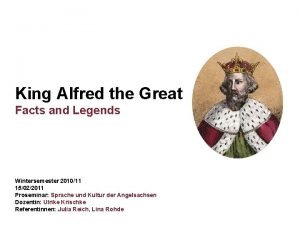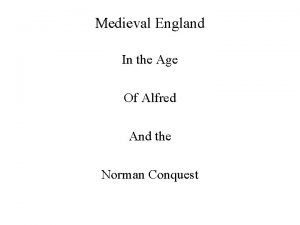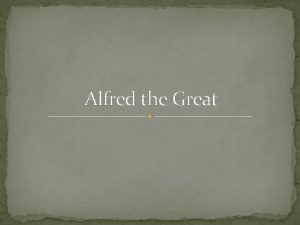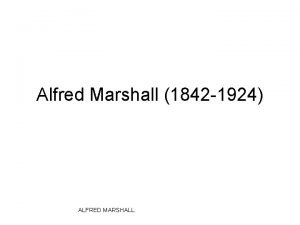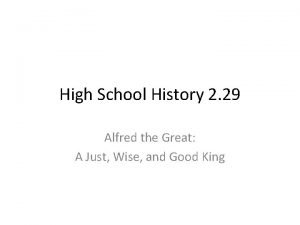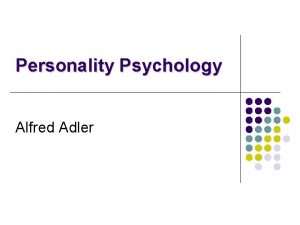High School History 2 27 Alfred the Great














- Slides: 14

High School History 2. 27 Alfred the Great Values Learning

Alfred The Great (849 -899 AD) Alfred was born in 849, the youngest of six children of Ethelwulf, King of Wessex. Alfred loved the traditional poetry of the Anglo-Saxons, which he memorized as it was read to him. He competed with his brothers to learn heroic songs and to win the praise of his mother. Alfred's youth was highlighted by two trips to Rome in 853 and 855, where he was honored by the Pope. When Alfred was 22 all of his brothers had died and he became king. He reigned from 871 to 879.

Alfred learned to read at 38 years old. Alfred surrounded himself with a dedicated group of English and foreign clerics. In 887, when he was 38, he began to learn to read English and Latin. The quality of his own writings suggests that he had a sound education in Latin. Between 893 and 899 he and his scholars translated several major Latin works to make them accessible to his subjects and thus restore the preeminence in religion and culture England enjoyed before the Danish invasions. The 870 s saw continuing war against the Danes, who were numerous, skilled, treacherous, and warred for conquest and settlement. These invasions damaged Christian faith and institutions.

Alfred used his education for good. Alfred encouraged military strength, moral laws for good governance, plus education and spiritual enrichment for his subjects. Though the ruling class spoke French, Alfred translated the Psalms into the English vernacular and included parts of the Ten Commandments in his laws. The translation program, in conjunction with education, was an attempt by Alfred so that more clergymen and some noble youth could read important texts.

Preface to translation of Alfred’s Pastoral Care Alfred explained his aims in a moving preface to the translation (893) of St. Gregory's Pastoral Care. The later translations which he undertook included Bede's Ecclesiastical History, Orosius's Universal History, Boethius's Consolation of Philosophy, and St. Augustine's Solioquies.

The Latin Psalter During the Middle Ages the Latin Psalter was the elementary text for instruction in Latin. The beginning of the book of Psalms contains the lamentations of King David in the face of severe oppression by his enemies. Alfred asserted the need to embrace learning and place trust in God. Alfred had the daily habit of listening to and reciting psalms. Alfred’s translation can be considered a personal handbook of consolation and guidance in times of affliction.

Translation from Latin to English In his first attempts at translation, Alfred had the Latin text read and explained to him by the religious clerics and then dictated a translation or paraphrase to his scribes. These efforts improved the quality of his prose and helped him develop his own views on man's nature, trials, and destiny along with interesting comments on the Anglo-Saxon world.

Psalms 1 -50 Discuss the following: How we can use our scriptures in a similar manner? What purpose does memorization and recitation serve? Choose a Psalms and discuss its meaning.

Alfred established a Court School. Alfred established a court school for the education of his own children, those of the nobility, and "a good many of lesser birth". His educational ambitions extended beyond the establishment of a court school. Believing that without Christian wisdom there could be neither prosperity nor success in war. It was important for Alfred to revive and encourage learning and wisdom. He believed God granted divine favor to learned kingdoms and he wished to redeem England.

Alfred created a codified set of laws. Alfred also created a codified a set of laws for his kingdom. Alfred first recorded the Ten Commandments directly from Exodus 20: 1 -17. Next, he recited many of the Old Testament case laws found in Exodus 21: 2 to 23: 9. In the New Testament he cites from Christ's Sermon on the Mount and also from the Acts of His Apostles. Finally, Alfred records his own case laws for medieval England using the scriptures.

A Quote from Alfred’s Book of Laws Alfred admonished, "Doom very evenly! Do not doom one doom to the rich; another to the poor! Nor doom one doom to your friend; another to your foe!“ Discuss: What do you think Alfred meant?

Alfred the Great’s Influence on Law Winston Churchill observed that Alfred blended these with the Mosaic Code, the Christian principles of Celto-Brythonic Law and old Anglo. Saxon customs. Churchill stated that Alfred’s Code was amplified by his successors and grew into the body of Customary Law administered by the Shire and The Hundred Courts. In the main principles of English Common law Thomas Jefferson concluded, "existed while the Anglo-Saxons were yet pagans, at a time when they had never yet heard the name of Christ pronounced or that such a character existed. " Alfred's laws were the basis of the Charter of Liberties, issued by Henry I of England 1100. The Norman kings were forced again and again to respect this body of law under the title the "Laws of Edward the Confessor, " the last Anglo-Saxon king. The signing of the Magna Carta in 1215 was just another example of the English determination to make their rulers obey the law.

Legacy The intellect, imagination, and energy of Alfred the Great seemed to grow in his last years. On his death in 899, he left a record of achievement which earned him his reputation as the greatest Anglo-Saxon king, as well as a legacy of military preparedness and strategy on which were based the victorious campaigns of his immediate successors against the Danes.

Reason and Relate Discuss Alfred the Great’s use of the scriptures to educate his people personally and protect his country militarily. What purpose would the scriptures serve? How would it make a difference? Discuss the following quote: “I desired to live worthily as long as I lived, and to leave after my life, to the men who should come after me, the memory of me in good works. ” – King Alfred
 King alfred the great facts
King alfred the great facts Was king alfred the great a bastard
Was king alfred the great a bastard Great kills high school staten island
Great kills high school staten island Alfred g waters middle school
Alfred g waters middle school Crescenta valley high school summer school
Crescenta valley high school summer school Assignment in spanish
Assignment in spanish Hát kết hợp bộ gõ cơ thể
Hát kết hợp bộ gõ cơ thể Lp html
Lp html Bổ thể
Bổ thể Tỉ lệ cơ thể trẻ em
Tỉ lệ cơ thể trẻ em Voi kéo gỗ như thế nào
Voi kéo gỗ như thế nào Chụp phim tư thế worms-breton
Chụp phim tư thế worms-breton Chúa sống lại
Chúa sống lại Các môn thể thao bắt đầu bằng từ đua
Các môn thể thao bắt đầu bằng từ đua Thế nào là hệ số cao nhất
Thế nào là hệ số cao nhất
